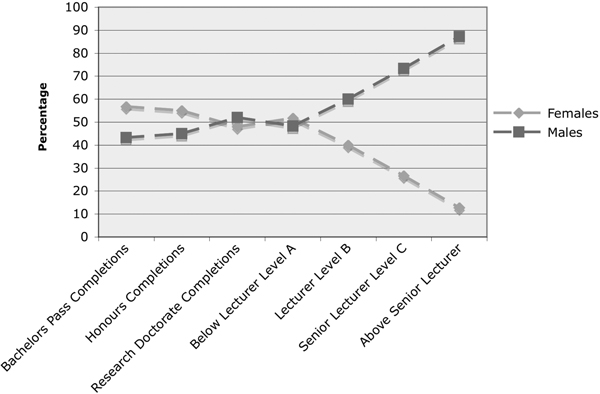I ended my recent rant about gender equity (June/July 2013) with a call to arms: “When will you—all you men out there—join the battle for gender equity? Don’t just leave it to women to challenge the men who rule their lives.”
At the time I was unaware of an initiative in my own country doing this, and extremely effectively. One reason that I had not before heard of Male Champions of Change [MCC] was that it is aimed at Australia’s most powerful and influential men, the leaders of banks, airlines, telecommunication and retail companies, and men in the most senior roles in government and the armed forces. These people don’t interact much with my academic world. However, this idea is so good that we simply must adapt to our own circumstances.
Since 1984 Australia has had a Sex Discrimination Commissioner, currently Elizabeth Broderick. Her office deals with a host of issues, including sexual harassment, domestic violence, maternity leave and slavery. In 2010 she established MCC as a coalition of male leaders in business and government committed to using their collective influence to put the issue of women’s representation in leadership at the forefront of the national agenda.
In 2011 they adopted a charter committing themselves to actively advancing gender equality across their businesses and to acting as public advocates. This charter contains most of the gender equity goals of academics like myself, such as Adopting and implementing employment policies and practices that eliminate gender discrimination in areas such as recruitment, hiring, pay, and promotion; Developing mechanisms to foster balance between work and family life for women and men; Sharing experiences and strategies for advancing gender equality within Australia’s corporate sector; and Being spokespersons for the promotion of gender equality, both individually and collectively.
This is not male paternalism, women needing to be saved by corporate knights in shining armor galloping in to fix the problem. It is best described in the words of one male champion: “Let’s not pretend that there aren’t already established norms that advantage men. Men invented the system. Men largely run the system. Men need to change the system.”
Do we in academia, and specifically in the statistics profession, need MCC? I think the answer is unequivocally Yes. Indeed, we’ve seen something like this before, in the Fourteen Points for Management of W Edwards Deming. His 14th point was “Clearly define top management’s permanent commitment to ever-improving quality… and its obligation to implement all of these principles.” Deming saw—and had experience to support the view—that change occurred in a company only if the top manager of that company strongly supported the change. It was said that he would not give advice to anyone in a company if he could not begin with a conversation with the top manager. As I see it, Elizabeth Broderick has reached the same conclusion: win over these powerful men, and we have a chance of winning over the people below them.
And who are our top managers? I would start with past and current chairs of our departments of statistics, presidents of our societies, and senior statisticians in business, government and industry. Following the recent, highly successful Women in Statistics Conference, wouldn’t it be wonderful to have a Male Champions for Change in Statistics Conference? Men could sign up, agree on a charter, and examine whether they are living up to their aspirations in championing women. They could learn from the corporate MCC, perhaps in analysing these elements of their leadership approach: what I say, how I act, what I prioritise, and what I measure.
They would need to develop strategies that are appropriate to our profession, and measures of effectiveness that make sense to us. The CEO of a large Australia telecoms company has decreed that all roles will now be advertised as available in a flexible work arrangement. This has the potential to impact over 40,000 employees (and their families) in this one organization. None of us have this kind of power, but we can all do a lot more than we are doing.
I learned about MCC at the terrific 2014 Women in Astronomy Workshop. I realized then what should have been obvious long ago, that we in Statistics have a lot to learn from other groups pursuing gender equity.
Mind the Gap… Academic Profiles by Gender; Natural and Physical Sciences 2007

Source: DEEWR Selected Higher Education Student Statistics 2007; DEST Special Report FTE Staff in AOU Groups 2007
Image courtesy of Prof Sharon Bell, Charles Darwin University
Comments on “Terence’s Stuff: Male Champions of Change (MCC)”